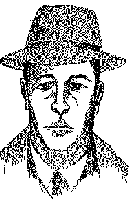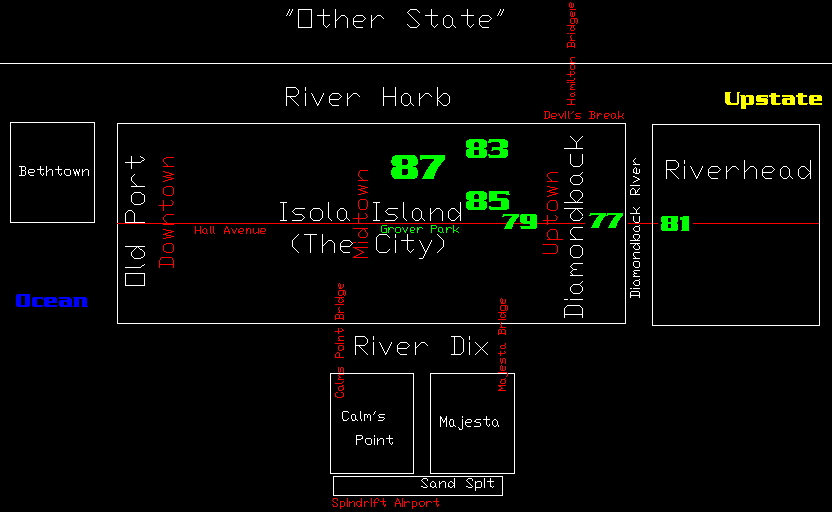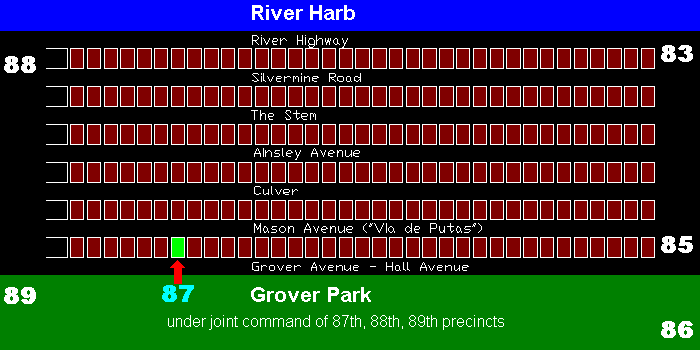

Ed McBain

Steve Carella
"self-portrait"
His Official Sites:
Ed McBain * Evan Hunter
(now taken down)
It shouldn't have come as such a surprise to me to find so many cops on the forum there
As explained elsewhere, I started reading McBain merely because he had written King's Ransom, on which Akira Kurosawa based his, as McBain and I agree, best movie, Tengoku to Jigoku - High and Low. What did I know. But I soon found out he's worth it, just like Kurosawa must have thought. He also wrote (as Evan Hunter) Blackboard Jungle and The Birds and several other movies. But let us keep this short and refer to the list below. As always, except for the funny things. Then, people have been searching the site for "mistakes by Ed McBain", and I've obliged.
Movies
based on Ed McBain
Funny things
Funny thing #1 is, McBain often refers to The Birds but only starts mentioning the, to me, much better movie High and Low after 1995 - must be when it was released in the USA on VHS. Then he finally saw what he'd done ("Is that the book I wrote?")
* NocturneFunny thing #2 is the almost standard way he handles the choice of some random date, obviously picking his own birthday.
"You see the Birds?" he asked. "That movie Alfred Hitchcock wrote?"
Carella didn't think Hitchcock had written it. (1997, page 76)
[D]id Willis happen to see the movie Alfred Hitchcock wrote?
Willis didn't think Hitchcock had written it. (page 174)
"That was a funny line Hitchcock wrote. Because how can birds get hangdog expressions?"
Carella shook his head in wonder. (page 226)
I never knew that!* Romance
Shellfish, after eating ocean algae tainted with domoic acid, was thought to be the culprit behind a 1961 attack of seabirds on people and cars in the oceanside California town of Capitola that inspired Alfred Hitchcock's horror movie The Birds.
Riganti had played a detective in the movie Fuzz which had been about policemen in Boston, and he had played a detective in the movie Without Apparent Motive which had been about policemen on the French Riviera, and he had played a detective in the movie Blood Relatives which had been about policemen in Toronto, and he had played a detective, albeit in Asian disguise, in the movie High and Low, which was about policemen in Yokohama. (1995, page 198)
* Gladly the Cross-Eyed Bear
I sometimes think all of life is Rashomon. If you have not seen the Akira Kurosawa film, too bad. It is almost as good as his High and Low, which was based on an American mystery novel the title of which I have now forgotten. (1996, chapter 11, page 269))
* The Last Dance
The movie she'd seen was part of a Kurosawa retrospective. It was titled High and Low, and it was based on a novel by an American who wrote cheap mysteries. (1999, page 41)
Just two examples; there are more. Once I had his e-mail address, I sent him congratulations on that day—but alas.
* KissFunny thing # 3 concerns the New York fire brigade, repeatedly referred to by Ed as "The Forty Thieves", for no doubt very good reasons. I managed to arrive there on the eve of 9/11 (just my proverbial luck), and with my customary tact started quoting him on this. All that hero admiration of Our Courageous Heroes made me sick. I can't remember my popularity growing because of that, but got my revenge much later. In the ruins of the WTC a fire truck was found, under loud booing and hissing of the workers there. It was jammed to capacity with stolen loot.
[It] gave his date of birth as 10/15 ... "Birthdate of great men," Carella said, but did not amplify. (page 80)
* The Last Dance
The mandatory heat for turning on the heat in this city was October 15th — birthday of great men, Carella thought, but did not say. (page 7)
There are many more funny things, and most you can find in Downtown maybe. But why don't you find out for yourself and possibly have a better time than I have to offer?
O yeah, Ed McBain was born in 1926 and died, alas, in 2005. This list meanwhile has grown even longer.
Titles have been sorted by date of appearance, when known.
87th Precinct Novels
Mathew Hope Novels
Other Novels
Evan Hunter Novels
Short Story Collections
Evan Hunter Novels
Children's Books
Screenplays
Teleplays
Funny Mistakes
Isola Map
THE 87TH PRECINCT NOVELS
Cop Hater (1956)
The Mugger
The Pusher
Killer's Choice (1957)
Killer's Payoff
Killer's Wedge Teddy is pregnant, but is that nitro in that bottle?
Vanishing Ladies (original pseudonym Richard Marsten)
The Con Man
Lady Killer (1958)
King's Ransom (1959)
Big Man (original pseudonym Richard Marsten)
Give the Boys a Great Big Hand
The Heckler
See Them Die (1960)
Lady, Lady, I Did It! (1961) Kling's Claire gets shot in a bookstore
The Empty Hours
Like Love (1962)
Ten Plus One (1963)
Ax (1964)
He Who Hesitates
Doll (1965)
Eighty Million Eyes (1966)
Fuzz (1968)
Shotgun (1969)
Jigsaw (1970)
Hail, Hail, the Gang's All Here! (1971)
Sadie When She Died (1971)
Let's Hear It for the Deaf Man (1972)
Hail to the Chief (1973)
Bread (1974)
Blood Relatives (1975)
So Long As You Both Shall Live (1976)
Long Time, No See (1977)
Calypso (1979)
Ghosts (1980)
Heat (1981)
Ice (1983) Cocaine, the theater and more
Lightning (1984)
Eight Black Horses (1985)
Poison (1987) Willis meets his "Argentina" prostitute; Meyer still smokes
Tricks (1987)
Lullaby (1989) murders coast-to-coast
Vespers (1990)
Widows (1991)
Lullaby — Vespers — Widows
Kiss (1992)
Mischief (1993)
And All Through the House (1994)
Romance (1995)
Nocturne (1997)
The Last Dance (1999)
The Big Bad City (1999)
Fat Ollie's Book (2003)
Money, Money, Money Prophetic: written before 9/11
>Barking at Butterflies<
The Frumptious Bandersnatch (2004) It was unavoidable: Ollie Weeks gets sympathetic
THE MATTHEW HOPE NOVELS
Goldilocks (1978)
Rumpelstiftskin (1981)
Beauty & the Beast (1982)
Jack & the Beanstalk (1984)
Snow White & Rose Red (1985)
Cinderella (1986)
Puss in Boots (1987)
The House That Jack Built (1988)
Three Blind Mice (1990)
Mary, Mary (1993)
There Was a Little Girl (1994)
Gladly the Cross-Eyed Bear (1996)
The Last Best Hope (1998)
OTHER NOVELS
The Sentries (1965)
>Where There's Smoke (1975)
Doors (1975)
Guns (1976)
Another Part of the City (1986)
Downtown (1991) Maybe one of his best. Absolutely hilarious.
Alice in Jeopardy (2005) His last? Set in Florida, with much more Keystone-like cops than in the 87th. Certainly more realistic.
But why not ask the other kids in the bus about that blonde woman?
as EVAN HUNTER
NOVELS
The Blackboard Jungle (1954)
Second Ending (1956)
Strangers When We Meet (1958)
A Matter of Conviction (1959)
Mothers and Daughters (1961)
Buddwing (1964)
The Paper Dragon (1966)
A Horse's Head (1967)
Last Summer (1968)
Sons (1969)
Nobody Knew They Were There (1971)
Every Little Crook and Nanny (1972)
McBain is a pretty good photographer, and this book carries a few of his portraits. Too bad quite a bit of dust shows up. Tss tss.
What it does make clear, for him this is a very complicated plot, but it's not anywhere near as intricate as one of Wodehouse's.
Come Winter (1973)
Streets of Gold (1974)
The Chisholms (1976)
Love, Dad (1981)
Far from the Sea (1988)
Lizzie (1985)
Criminal Conversation (1994)
Privileged Conversation (1996)
COLLECTIONS of short stories
Running from Legs and Other Stories
There Was a Little Girl
Happy New Year, Herbie (1963)
The Easter Man (1972)
CHILDREN'S BOOKS
Find the Feathered Serpent (1952)
The Remarkable Harry (1959)
The Wonderful Button (1961)
Me and Mr. Stenner(1976)
SCREENPLAYS
Strangers When We Meet (1959)
The Birds (1962)
Fuzz (1972)
Walk Proud (1979)
TELEPLAYS
The Chicholms (1979)
The Legend of Walks Far Woman(1980)
Dream West (1986)
based on his novels:
Fuzz
High and Low (Akira Kurosawa)
Mistakes
Some anonymous chappie who didn't sign his name has been using the FreeFind search engine to look for "Ed McBain's mistakes". There may be many more of those than I could hope to find. Who doesn't make mistakes? Even godt has made some, lemme tell ya - especially it. Even so, Ed McBain was enormously irritated by this little list, mainly because, his expression, it was "obviously perfect".
But I do feel he overreacted. This is all in good clean fun, not at all like Mark Twain's snide remarks on The Last of the Mohicans or Science and Health. Boy, must these guys have hated Twain's guts! Besides, Ed himself was always at it.
- Bread. A German writes a letter in 'Teutonically stiff English' and states his firm "quite well the animals packed". Wodehouse and Mark Twain never got the hang of that either, but a German (or Dutchman, for the matter of that) would never make that mistake—rather, they'd make the one of writing that they "the animals quite well packed".
- The Big Bad City
I'm not what you'd call really intimate with alligators, so am not entirely sure about this one. But there's a scene in here where a guy topples from a deck into an alligator pool, and is eaten alive with sound effects of much threshing and gnashing of teeth. The point is that according to John D. MacDonald (who, living in Florida, was better acquainted with these amiable fauna than either Ed McBain or I) an alligator prefers to sneak your body along quietly, stick it below some roots underwater and let it ripen like a cheese before he eats it. Only then she really relishes the result. But I wouldn't like to put this to the test.
And yes, it turns out I was wrong here:
An alligator grabbed and killed a Florida woman who disappeared while jogging near a canal, according to Reuters (May 11, 2006)
the 18th fatal attack in Florida since the state began keeping records in the 1940s.
- The Last Dance. Here, McBain honestly seems to believe that, if you are in Marquis' WHO'S WHO, you really are famous; guaranteed ("a celebrity", page 193). Well, Ed, and, by the way, John D. MacDonald and to Whom Else It May Concern, I'm in there myself and I don't think I'm such a big shot. Matter of fact, I've tried to get listed in the Guinness' BOOK OF WORLD RECORDS as the poorest man who ever made it to Marquis' WHO'S WHO IN FINANCE AND INDUSTRY, where I'm in as well, but they didn't think that much of a record. Go look it up if you don't believe me. (It all came about just because I was a subscriber to the SMITHSONIAN magazine. I guess they kicked me out by now for not taking it seriously enough.)
From the same book, a bit of dialogue and business; you find the mistake, Harold:
Again, he looked at the document only perfunctorily, handed it to Cynthia, and asked, "Did you make this call?"- Downtown. This one, good and funny as it is, has a hole in the plot you could drive a dreadnought through. Ed McBain in the same book repeatedly refers to Hitchcock's term "mcguffin" for the incident that sets the plot a-rollin', which here is when Our Hero gets robbed by a fake cop after a chick he meets in a bar claims he has stolen her ring. (Others say, the "MacGuffin" is the item the plot revolves on, but which the public does not care a hoot about, like the stolen atom secrets).
"Well, may I see it?" she said.
He handed her the printout.
Later in the book, that cop turns out to be an actor hired by that chick to play a cop, so she could get his ID papers, which she wanted to blow up for wall decorations at a surprise birthday party she intended to throw for Hero mentioned above. In fact, she of course wanted them for another and quite illegal purpose.
But the way the mcguffin is written, not even the most stupid actor in the world (and I have met some) would believe the chick and Hero knew each other at all, let alone she would throw a birthday party for him.
A very funny one is where three crooks come back into a room and start wondering who left the lights ON. I mean to say, if none of them did? I mean to say, now if they'd wondered who switched them ON?
- Ice. The word "tonsure" refers to the shaven spot on a priest's skull, and not to the hair left around it. Dominus vobiscum.
-Jigsaw. This one really made me laugh. So much that I still can't decide if it was actually meant as a joke or not. Carella asks somebody to write down what he's been doing and, later, reads the list. The last two items on it are:
3.25 a.m. - [I t]yped timetable for Detective Carella.- Kiss. Carella and Meyer notice a small spot of red. "Blood", of course. Only, it's over 24 hours after the murder and it would have been brown by then. The same mistake, only worse (at least 3 times as bad), is made by Conan Doyle in The Adventure of the Second Stain - and he was an M.D.
3.30 a.m. - Detective Carella left. [I w]ent to bed.
- Where There's Smoke. The main character Smoke supposedly got his name from a Dutch ancestor. However, the US Immigration (or some such busybody) changed it from the original "Smoak" to "Smoke". Is the book's story. Sure, things like that have happened all over, like "Mangiacabalho" to "MacDonald" (heh, heh). Only trouble is, the Dutch would spell it "Smook", not "Smoak". For really weird Dutch names, check here.
-Mischief. This is one of the only 3 instances where I found an author using virtually the same scene again in another book. Here, it's Kling calling Sharyn from a phone cell, standing in the rain, the same act he pulls in The Last Dance.
The other instances are P.G. Wodehouse and Arthur Conan Doyle.- Nocturne. On page 47, McBain writes "In the United States of America, no one is obliged to reveal his race, color or creed in any application form." Maybe. But when you as a foreigner applied for a USA visum (which they in their ignorance call a "visa", the plural), you had to answer the question "face color" on the form. In Holland, they had added between brackets "Pale, ruddy, etc." I always wrote "white", you can't fool me... That's sheer racism! But practical, let's face it.
In Sam the Sudden (Wodehouse), what Billy Wilder used to call thecute-meetscene has a guy climbing a treacherous elm tree to get a kitten out. It occurs again in a book (still looking for it) he wrote some 50 years later, when Wodehouse had been re-reading StS to write an introduction for it; which explains it.
A paragraph in Arthur Conan Doyle's The Resident Patient makes no sense at all;in a later story The Adventure of the Cardboard Box it does make sense.
On page 181, Ed really asks for it when he starts explaining how El Castillo de Palacios would have been ungrammatical:
"Palacio meant 'palace' in Spanish, and palacios meant 'palaces', and when you had a plural noun, the article and noun were supposed to correspond [...] El Castillo de los Palacios would have been the proper Spanish."
But who says I need to put in the article? Huh? Need I say "los errores de los autores"? No sir, not at all. Serves him right for being such a pedant.
- Long Time, No See. Deaf or Blind? Teddy, Carella's wife, is deaf and dumb, which he goes out of his way for not to see it as a handicap. That's fine, but I still do. (I have plenty other handicaps of my own and wouldn't need that one on top, thank you). What makes this funny to me is that in Long Time No See being blind is obviously seen as a handicap sure enough - and rightly so.
- The Last Best Hope has a scene wherea woman is corrected for her pronunciation of the German gun brand Walther as "Walter". Should be "Walther", with a th as in thick, says a know-it-all. Only problem here is, the Germans do not use that sound and indeed pronounce the word as "Walter".
I forget in what book Carella sees a Nouvelle Vague film with Teddy. Real torture for her as all texts are spoken off-screen, or the character hides behind a bunch of flowers, thinks like that. Result, she can't lip-read and doesn't understand what it's all about. But Ed, in turn, doesn't understand why this would be so: there just was no money for synch sound in those low-budget movies. Not showing the actor's uttering mouth was more of a necessity than an artsy conceit.
But much worse is that only at the very end the crime is solved because Carella finally looks at the dog collar. Everybody would have done so in the first place. Now, I agree with Das Kapitan that "mittout der Monkey Business, das Comic Strip ist kaput!", but in that case, don't make so much to-do about that goddam dog. Pretty clumsy, that, Ed! (Trivia Dept.: It may indeed be none of our goddam business what the "C" in Charlie C. Clarke stands for in this book, but in Arthur C. Clarke it stands for "Charles").
- Alice in Jeopardy. I honestly don't know about this, but McBain writes on page 197:
The numbers racket [...] is premised on the insurance business, which is why it's sometimes known as the 'policy game' - but that's another story.I wonder. It is formally called
the mutual race horse policy, but I couldn't find any relation with real insurance - a crook business as that may be. Anybody knows? Please tell me.

Canon Doyle Confused
Poe Bugged
Isola Map.
Just to get around a few little problems, McBain changed the, obviously Manhattan, location to a fictitious Isola, and sometimes works himself into deep trouble as a result. I have tried to draw a map of Isola, but it's really nonsense. It's mainly based on the geography lessons in Long Time, No See; but in Lullaby it's emphatically stated that Isola is on the other side of the continent from Seattle. Which to me makes it on the East coast, just like New York, am I right? But the "Old Port" is on the West, so the rivers flow in entirely the wrong direction. Also, the Avenues, E-W, should be short and the streets, N-S, long, so Isola is the wrong shape on my map; it should be oriented N-S, just like the real Manhattan, only with Avenues becoming Streets.
See if you can make some sense out of this mess. The fat green numbers are known Precincts' locations.

Map of Isola?
As always, please correct me if I'm wrong.
.But Ed doesn't need to feel bad about this (even if he was so inclined); I tried the same thing with R.L. Stevenson's Treasure Island once to make a digital simulation of it, and it was just hopeless. And even a guy like C.S. Forester gets totally confused in The Earthly Paradise.

While Ed McBain mostly locates the 87th building "midtown", in Lady Killer he describes it as looking out on Grover Park, you'd think from the front. Then, he puts it between 6th and 7th of 33 Streets; to me, that's downtown? The entrance has to be on Hall Avenue, then. In Cop Hater, in front of the precinct building there's a small park—or is it the same Grover after all?
In the scene where Steve is disturbed by the sun reflecting from binoculars used in the park is another small mistake.
Somebody remarked that Isola, being imaginary, adapted itself to what the author needed. A well-taken point: just like Blandings Castle in the Wodehouse series. Still, after PGW's death it was possible to amalgamate it all into one consistent unit (it's in Sunset at Blandings). Isola doesn't. That's fine with me, I just wanted to find out.

Map of the 87th Precinct with all known Avenue names.
based on Killer's Wedge
For maps of the real thing, click on Google Earth!
Here a list of seemingly reasonable matches of Ed locations versus New York, in alphabetical Isola order. Some are mere guesses, some I can't even guess at (but after all, I don't live there - sure is a nice place to visit, though):
Silvermine Oval
| books | "real" |
| This City | New York |
| Bethtown | Richmond, Staten Island |
| Bridge Street | Canal Street |
| Calms Point | Brooklyn |
| Hopscotch | Chelsea? (downtown) |
| the City | Manhattan |
| Sand Spit | Sand Point, Long Island I'd figured Coney Island or Rockaway, but Nicole Taylor helped me out here |
| Columbus Circle PJ rozmini helped me out there a grateful tip of the Dunce Hat! | |
| Devil's Break, Byte | Spuytenduyvil |
| Diamondback | Harlem |
| Diamondback River | Harlem River |
| Franklin Airport | La Guardia |
| Grover Park | Central Park |
| Hall Avenue | "Big shopping street" across Grover Park, alias NYC's 5th Ave. PJ rozmini helped me out there |
| Hamilton Bridge | Washington Bridge |
| Hightown | Washington Heights |
| Isola | Manhattan |
| Lewiston | 6th Ave/The Americas |
| Majesta | Queens |
| Majesta Bridge | Queensborough Bridge |
| The Quarter | Greenwich Village |
| River Dix | East River |
| River Harb | Hudson |
| Riverhead | The Bronx |
| Seawall | The Battery |
| Smokerise | |
| Spindrift Airport | Idlewild (now J.F.K.) |
| The Stem, Stemmler Ave | Broadway |
| out of town | |
| Euphemia | Bayonne/Hoboken |
| Castleview | Sing Sing |
| The Other State, Across the River | New Jersey |
Please tell me about those I have missed!
More Maps

Movies
based on Ed McBain's work
Fuzz, director Rochard A. Colla, (1972)
The Birds, Alfred Hitchcock (1963)
High And Low, Akira Kurosawa, (1963)

even more

SEARCH this site or the Web

copyright notice
all material on this site, except where noted
copyright © by harrie verstappen , curaçao
reproduction in any form for any purpose is prohibited
without prior consent in writing